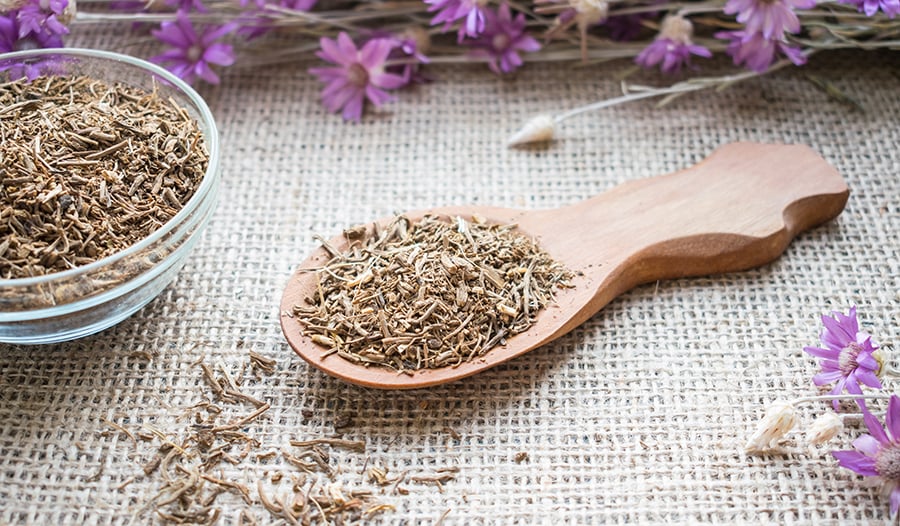Valerian Root Benefits: Natural Relief for Sleep, Mood, And Menopause

Key Takeaways
- Valerian root is a traditional herbal remedy long used for its sedating effects to treat insomnia, anxiety, and restlessness.
- Compounds in valerian, like valerenic acid, are believed to boost levels of GABA, a calming neurotransmitter in the brain that helps regulate nerve impulses and promote relaxation.
- Sleep + Anxiety Support: Research suggests valerian may help reduce the time it takes to fall asleep, improve sleep quality, and alleviate symptoms of anxiety and stress without the dependency risks of some pharmaceuticals.
- Beyond Sleep: Valerian may also offer benefits for menopause symptoms (like hot flashes), muscle spasms, pain relief, and improving focus.
- Safety: Generally considered safe for most adults and children when used as recommended, though it should be avoided during pregnancy or nursing.
What Is Valerian Root?
Native to Europe and Asia, Valeriana officinalis also grows in North America. With documented medicinal use dating back to early Greece and Rome, valerian has historically been used to treat insomnia, stomach cramps, and migraines. In today’s society, valerian root is promoted to treat anxiety, depression, insomnia, premenstrual syndrome (PMS), headaches, and menopause.
Also called garden heliotrope, valerian grows round, flat flower clusters that range from pink to white. Valerian is a perennial herb that grows three to six feet tall and is part of the Valerianaceae family. The rhizomes (underground stems) and roots of valerian are used for medicinal purposes.
Valerian root may have many benefits related to its calming and sedating effects.
What Are The Benefits Of Valerian Root?
Those with mental health or sleep concerns may find valerian root a viable option for natural relief. Here are some of the best valerian root benefits:
1. May Help with Insomnia
A review of 60 studies on valerian root concluded that valerian could be a safe and effective herb to promote sleep and prevent associated disorders.
It is believed that valerian promotes sleep in a variety of ways due to the active phytochemicals found within the roots and rhizomes.
Valerenol and valerenic acid, two compounds found in valerian, are known to stimulate gamma-aminobutyric acid (GABA) receptors in the body. GABA is a chemical messenger, also called a neurotransmitter, that plays an integral role in sleep and nerve impulse regulation. These two compounds can increase GABA production in the body, and valerenic acid also inhibits an enzyme that breaks GABA down. Increasing GABA in the body has sedating effects that would promote sleep and calming relaxation.
Serotonin is another neurotransmitter that plays a vital role in sleep regulation. It is thought that some phytochemicals found in valerian may also stimulate serotonin receptors.
If you suffer from insomnia or other sleep disorders, valerian root could be right for you. The research concludes adding valerian root to your supplement regimen may reduce the amount of time needed to fall asleep, in addition to increasing sleep duration and improving sleep quality. There is also valerian root tea available if you want to drink a cup before bed.
Unlike many pharmaceutical sleep medications, valerian is not likely to cause unwanted side effects such as dependency or drowsiness upon waking. Valerian root for sleep issues is a great, natural way to go.
2. May Help Anxiety
Valerian root’s calming effects can not only help with sleep, but they can also help with symptoms of anxiety.
Anxiety is defined as a feeling of worry, nervousness, or unease, typically about an imminent event or something with an uncertain outcome. In today’s society, between the pandemic and economic uncertainty, anxiety is on the rise. Rates of anxiety, depression, and substance use disorder have increased since the beginning of the pandemic. Valerian root could help.
One study looked at 39 people taking valerian root one hour before bed for one month. The study found that they had significant reductions in anxiety symptoms compared to placebo.
Many studies have shown that valerian root can alleviate symptoms of anxiety and create a sense of calmness by interacting with the GABA receptors in the brain.
3. May Help with Depression
The same study that looked at 39 individuals taking valerian root one hour before bed also noted improved depression symptoms.
One theory behind the improved depression seen in the study is the valerian root’s ability to promote calm and relaxation, helping to reduce stress levels. Depression has been associated with chronic stress. Helping to manage stress with valerian root could have a positive impact on depression.
Another theory is that because valerian root has positive impacts on sleep and insomnia, there are subsequent positive impacts on depression. This is because depression is often accompanied by insomnia or difficulty sleeping. By improving sleep, valerian root may indirectly help with depression symptoms.
A more direct cause could be related to the stimulation of GABA receptors by the valerian root. Studies of depressed patients found that those suffering from major depressive disorder have reduced brain concentrations of GABA. Since valerian root can increase GABA levels, this can likely be the reason it can significantly improve depression symptoms.
If you suffer from depression, increasing your GABA levels with valerian root supplements could prove beneficial.
4. May Help with Pain and Muscle Spasms
Valerian root has been used historically for pain and spasms, both internally and topically. It has been used to treat menstrual pain, rheumatic pain, intestinal colic, and migraine pain.
One study looked at 50 mice given valerian root. The results showed a significant decrease in pain score in the acute phase observed in the group that received valerian root extract compared to the control group.
Yet another attribute of the GABA-increasing abilities of valerian root is the reduction of muscle spasms. GABA calms the nervous system by preventing the transmission of certain nerve signals. This can have positive benefits for both pain and muscle spasms caused by overactive nerves.
Valerian root is also known to have mild analgesic or pain-relieving properties.
Taking valerian root supplements may be beneficial for those suffering from pain and muscle cramps.
5. May Help with Hyperactivity and Focus
Valerian root and lemon balm extracts have shown efficacy and excellent tolerability in children who have restlessness.
A study followed 169 primary school children who suffered from hyperactivity and concentration difficulties but did not meet the criteria for a clinical diagnosis of attention deficit hyperactivity disorder (ADHD). The children were given 640 mg of valerian root and 320 mg of lemon balm extract daily.
The study found that after seven weeks of observation and reporting by pediatricians and parents, the children who had strong to very strong symptoms of poor ability to focus went from 75% to 14%, hyperactivity from 61% to 13%, and impulsiveness from 59% to 22%.
Parent-rated sleep, symptom burden, and social behavior showed high levels of significant improvement. Only two children showed mild, transient adverse reactions to the herbal extracts.
A combination of valerian root and lemon balm could be a helpful combination for children and adults who suffer from hyperactivity and or focus and attention deficit issues.
6. May Help with Menopause
An inevitable part of life for all women, menopause can be a difficult and trying time. Hot flashes are among the most common complaints of menopausal women, affecting their family interactions, career, social activities, romantic relationships, and quality of life.
A study of 68 menopausal women suffering from hot flashes gave the participants 255 mg of valerian root in capsule form three times daily. The results showed a significant difference in hot flash severity in the group receiving valerian compared to the placebo.
The researchers concluded that valerian could be effective in the treatment of menopausal hot flashes and that it can be considered as a treatment of choice for hot flash reduction in women who are reluctant to receive hormone therapy.
Valerian Root Precautions And Side Effects
Valerian root is considered a safe herb for most people, including adults and children, when taken as recommended. Some uncommon side effects may include headache, dizziness, fatigue, metallic taste, diarrhea, and weakness.
Do not take valerian root if pregnant or nursing. Valerian could also interact with certain medications, including antibiotics.
Always consult your doctor before adding a new supplement or herbal extract to your or your child’s health care routine.
The Big Picture
Valerian root has a long history of medical use around the world. Many ailments that can benefit from calming the nervous system can be treated with its use.
Insomnia is perhaps the most common reason valerian root is taken as a supplement. However, valerian root has other potential medicinal uses, including pain, muscle spasms, menopause, hot flashes, hyperactivity, attention deficit, depression, and anxiety.
Due to valerian’s ability to increase GABA in the body, a chemical that plays a vital role in sleep, calmness, relaxation, and nerve impulse regulation, many conditions may benefit from these medicinal properties.
References:
- Yuan, C. S., et al. "The gamma-aminobutyric acidergic effects of valerian and valerenic acid on rat brainstem neuronal activity." Anesthesia & Analgesia. (2004).
- Bruni, O., et al. "Herbal Remedies and Their Possible Effect on the GABAergic System and Sleep." Nutrients. (2021).
- Shinjyo, N., et al. "Valerian Root in Treating Sleep Problems and Associated Disorders-A Systematic Review and Meta-Analysis." Journal of Evidence-Based Integrative Medicine. (2020).
- Kelber, O., et al. "Valerian: no evidence for clinically relevant interactions." Evidence-Based Complementary and Alternative Medicine. (2014).
- Bruni O, Ferini-Strambi L, Giacomoni E, Pellegrino P. Herbal Remedies and Their Possible Effect on the GABAergic System and Sleep. Nutrients. 2021;13(2):530. Published 2021 Feb 6. doi:10.3390/nu13020530
- Caudal D, Guinobert I, Lafoux A, et al. Skeletal muscle relaxant effect of a standardized extract of Valeriana officinalis L. after acute administration in mice. J Tradit Complement Med. 2017;8(2):335-340. Published 2017 Oct 12. doi:10.1016/j.jtcme.2017.06.011
- Gromball J, Beschorner F, Wantzen C, Paulsen U, Burkart M. Hyperactivity, concentration difficulties and impulsiveness improve during seven weeks' treatment with valerian root and lemon balm extracts in primary school children. Phytomedicine. 2014;21(8-9):1098-1103. doi:10.1016/j.phymed.2014.04.004
- Mirabi P, Mojab F. The effects of valerian root on hot flashes in menopausal women. Iran J Pharm Res. 2013;12(1):217-222.
- Pakseresht S, Boostani H, Sayyah M. Extract of valerian root (Valeriana officinalis L.) vs. placebo in treatment of obsessive-compulsive disorder: a randomized double-blind study. J Complement Integr Med. 2011;8:/j/jcim.2011.8.issue-1/1553-3840.1465/1553-3840.1465.xml. Published 2011 Oct 11. doi:10.2202/1553-3840.1465
- Saeed H, Eslami A, Nassif NT, Simpson AM, Lal S. Anxiety Linked to COVID-19: A Systematic Review Comparing Anxiety Rates in Different Populations. Int J Environ Res Public Health. 2022;19(4):2189. Published 2022 Feb 15. doi:10.3390/ijerph19042189
- Shinjyo N, Waddell G, Green J. Valerian Root in Treating Sleep Problems and Associated Disorders-A Systematic Review and Meta-Analysis. J Evid Based Integr Med. 2020;25:2515690X20967323. doi:10.1177/2515690X20967323
- Tammadon MR, Nobahar M, Hydarinia-Naieni Z, Ebrahimian A, Ghorbani R, Vafaei AA. The Effects of Valerian on Sleep Quality, Depression, and State Anxiety in Hemodialysis Patients: A Randomized, Double-blind, Crossover Clinical Trial. Oman Med J. 2021;36(2):e255. Published 2021 Mar 31. doi:10.5001/omj.2021.56
- Zare A, Khaksar Z, Sobhani Z, Amini M. Analgesic Effect of Valerian Root and Turnip Extracts. World J Plast Surg. 2018;7(3):345-350. doi:10.29252/wjps.7.3.345
DISCLAIMER:This Wellness Hub does not intend to provide diagnosis...
















































































 Table of Contents
Table of Contents















